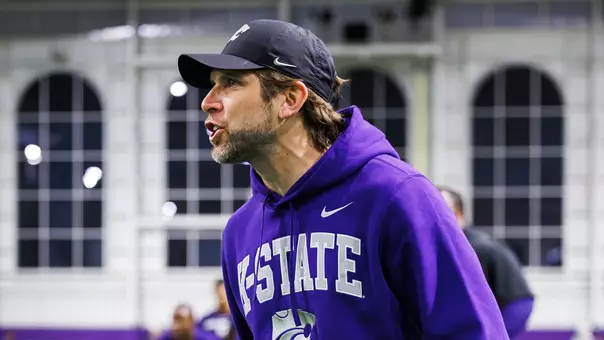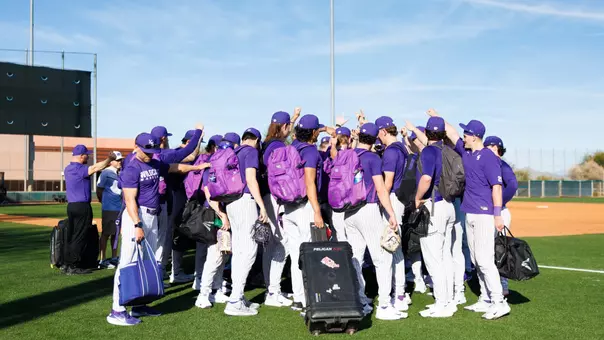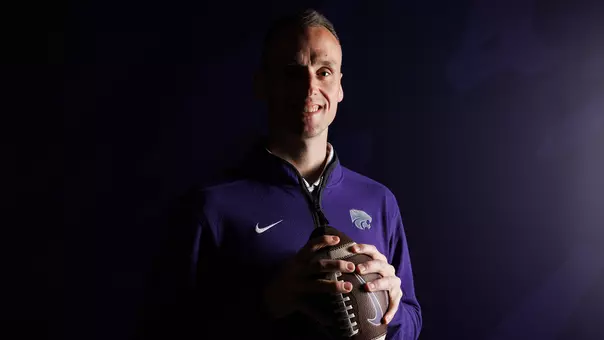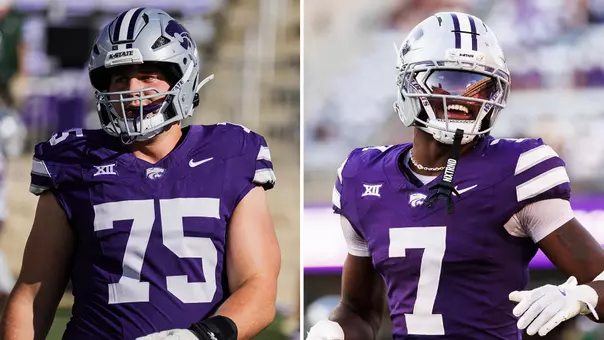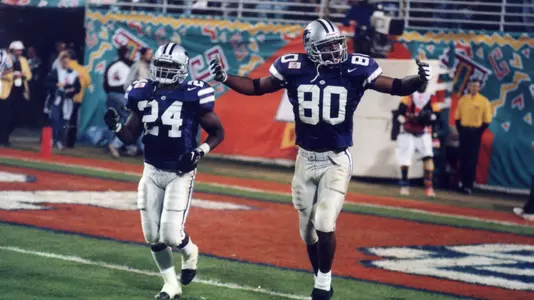
SE: Playing with a Chip on My Shoulder
Dec 23, 2021 | Football, Sports Extra
By Darnell McDonald as told to D. Scott Fritchen
Obviously, Michael Bishop ran for a bunch of yards during the 1997 season, and the game plan back then revolved around him running, and the running setting up passes if we needed it. When they threw the ball, I was scoring touchdowns. I had 21 catches for 441 yards and 6 touchdowns, and although that was the best by a K-State receiver that season, my performance still ranked near the bottom of the conference, so I wasn't happy about my output.
That all changed when we reached the 1997 Fiesta Bowl.
That's when I had 7 catches for 206 yards and 3 touchdowns, and set two Fiesta Bowl records in our 35-18 win over Syracuse at Sun Devil Stadium. I equaled half of my regular season statistics in a single postseason game. It was like a dream for me.
The whole 1997 season was humbling for me. In high school and in junior college, they threw the ball to me almost every single play. I had to learn to be a better team player that 1997 season. We were winning, so there was no reason for me to complain or have an attitude about not getting the ball. I couldn't complain about anything. I had to do my part as a team player and block hard and do the things that would help the team.
My road to K-State was very interesting. I've never told anyone this story. Coming out of high school, I got sent to Garden City Community College by Michigan State. They had been recruiting another player out of Virginia and they saw me perform on the player's highlight tape and were interested in me. Michigan State said, "After you graduate, we want you to come here." Kansas State would come visit me at Garden City because I was playing in Kansas. They were also recruiting some of my teammates. They visited game after game and showed interest in me. Michigan State never came. I guess Michigan State just assumed I'd go back to them because they sent me there.
As I graduated from Garden City, Michigan State was recruiting Plaxico Burress, who went onto become an All-American. Meanwhile, Kevin Lockett graduated from K-State after the 1996 season and no returning K-State wide receiver had a ton of experience. I said, "K-State would be a better opportunity for me." K-State was persistent and chatted with me. I finally said, "I'm not going to Michigan State." Michigan State was furious. But Michigan State already had their guy.
Our 1997 K-State team was dangerous because of junior college transfers. Every junior college transfer made a big contribution to our 1997 season. At that time, it wasn't cool to recruit from junior college. Coach Snyder made it popular to recruit junior college players. K-State already had a nucleus they had built all these years, but they needed to add one thing to the bus to make it go. I think it was the junior college transfers that came in and put the right fixings on something that they'd already built. We were waiting to arrive on the scene and explode.
During the season, we were rolling teams and then suffered the 56-26 loss at Nebraska. There was no question we'd bounce back. That loss helped us. We walked into that game thinking we were going to blow them out. I don't know if we all got scared of Nebraska or their legacy, but something happened and we all kind of folded. The only player who didn't fold was Michael Bishop. He played until the last second.
That loss fueled us all to get better.
Obviously, we won the rest of our games. Then came Syracuse. I was already star struck because Donovan McNabb was on the other team. I was already a fan having watched him in the previous couple of years. I knew he was amazing and was going to be a high draft pick. I was like, "Wow, we're about to go against them." I was a fan, but I wasn't worried our defense stopping them with Jeff Kelly, Mark Simoneau and Travis Ochs. I went into the game as a kid who'd never been at this level going against a big-name quarterback in a bowl game. I was in shock.
Going into the game, someone interviewed me, and the reporter basically said in a snarky way, "What are you guys going to do to help when this game?" The tone of the question indicated that he didn't think we would do anything, because as a receiving corp we hadn't been productive most of the year.
I said, "The receiving corps will have a good game. It'll be mainly because of the receiving corps that we're going to win this game."
The reporter laughed it off.
The night before the game, all the receivers were in my hotel room. I was upset. Gavin Peries said, "Well, he's not lying. We didn't do anything all year." We just hadn't had the opportunity. I just believed the games would be easier if we threw the ball more. It would help Bishop running the ball. I went into the Fiesta Bowl with a chip on my shoulder. I was upset about the interview.
When we got into Sun Devil Stadium, it was crazy. It was crazy because it felt like a home game. We had 50,000 fans. K-State fans supported our team like no other. It's like they knew that it was going to happen and that 1997 and 1998 would be the years for K-State. They supported us to no end. These people flew and drove so far to get to this game that it felt like a home game. It felt so good to be so supported. I was like, "Wow." It's like you're at home with mom's cooking. You have the family there and are just feeling good and happy. We wanted to play harder for all the K-State fans that made the trip.
At the beginning of the game, Syracuse was stopping our running game with Bishop and Eric Hickson a little bit. I thought we'd have to start throwing it. Coach Snyder opened up the playbook.

We led 21-15 at halftime and nobody scored in the third quarter.
Then we threw it at them in the fourth quarter.
I remember the 77-yard touchdown catch vividly for the simple fact that Michael Bishop made a change in the play during the play. As he started changing the play, he didn't realize that time was running out. At that point, my route was a five-yard stop route. When he changed it, I heard some of the play, and Martez Wesley tried to relay it to me, but I knew I wasn't running a five-yard stop anymore. I knew he'd changed it, time was running out, and he just hiked it.
When he hiked it, I wasn't even ready to run. I just ran the stop-route anyway, because all I was thinking was, "Coach Snyder's not going to be mad at me because I ran the wrong route." So I ran the route and when I turned around I saw the snap was low, Michael scooped it up and started running to the right. I just turned around and started running deep. I knew he was going to throw it. That's one thing I loved about Michael was that he was going to give you a chance as a receiver to make a play.
When he threw it, this guy was holding me, and I didn't think I'd be able to get loose. At the last second, he let go as the ball was coming down, and I caught it, and then I was thinking, "Please, don't step out of bounds." The angle the guy was taking, I knew he wasn't going to be able to take me down. I thought I stepped out of bounds, but I kept running, anyway. It was so loud in that stadium I couldn't hear whistles and it was a touchdown. It was an amazing feeling.
Then with under 4 minutes to go, Michael hit me with a 41-yard touchdown pass to put the game away. It's funny because all year my coaches would tell me when the defense was playing cover-2 to always go outside. I always thought it was easier to go inside because the cornerback was playing outside and he's trying to not allow me to go outside. That was the cornerback's responsibility in cover-2. I always told my coaches, "I can get inside so easily and fade back outside." On that touchdown play, I went inside and the first thing I thought about running down the field was, "Oh my gosh, now I'm going to hear about this because I went inside."
I went inside and faded outside, and I didn't think the ball was going to come to me at this point. Then I turned and looked, and the ball was coming to me 100 miles-per-hour. I was like, "Oh my gosh, I'm wide open right now." I made the catch and went into the end zone and thought, "I'm about to get yelled at for this touchdown." On the play, I wasn't thinking about scoring a touchdown, I was just upset that I'd made a mistake that the coaches had tried to fix for the longest time. But it ended up being a touchdown.

We won 35-18 and walked off the field with 11 wins for the first time in school history. It really felt like deja vu because it felt like it had been predestined for all of this to happen. Walking off the field and seeing the crowd, I thought, "This happened before." It's like it had already happened before. It was surreal. It was supposed to happen.
The celebration for the 1997 Fiesta Bowl was short lived for me. Writers wrote that I was a "one-game wonder." I had just showed at the highest level at Division I that I could do it, and some people still didn't think I could do it. I was frustrated. I wasn't able to soak in how well I'd played in the game because the comments of "one-game wonder" came immediately after the game.
Those comments after the 1997 Fiesta Bowl fueled me.
In 1998, I was the player I knew I could be.
Obviously, Michael Bishop ran for a bunch of yards during the 1997 season, and the game plan back then revolved around him running, and the running setting up passes if we needed it. When they threw the ball, I was scoring touchdowns. I had 21 catches for 441 yards and 6 touchdowns, and although that was the best by a K-State receiver that season, my performance still ranked near the bottom of the conference, so I wasn't happy about my output.
That all changed when we reached the 1997 Fiesta Bowl.
That's when I had 7 catches for 206 yards and 3 touchdowns, and set two Fiesta Bowl records in our 35-18 win over Syracuse at Sun Devil Stadium. I equaled half of my regular season statistics in a single postseason game. It was like a dream for me.
The whole 1997 season was humbling for me. In high school and in junior college, they threw the ball to me almost every single play. I had to learn to be a better team player that 1997 season. We were winning, so there was no reason for me to complain or have an attitude about not getting the ball. I couldn't complain about anything. I had to do my part as a team player and block hard and do the things that would help the team.
My road to K-State was very interesting. I've never told anyone this story. Coming out of high school, I got sent to Garden City Community College by Michigan State. They had been recruiting another player out of Virginia and they saw me perform on the player's highlight tape and were interested in me. Michigan State said, "After you graduate, we want you to come here." Kansas State would come visit me at Garden City because I was playing in Kansas. They were also recruiting some of my teammates. They visited game after game and showed interest in me. Michigan State never came. I guess Michigan State just assumed I'd go back to them because they sent me there.
As I graduated from Garden City, Michigan State was recruiting Plaxico Burress, who went onto become an All-American. Meanwhile, Kevin Lockett graduated from K-State after the 1996 season and no returning K-State wide receiver had a ton of experience. I said, "K-State would be a better opportunity for me." K-State was persistent and chatted with me. I finally said, "I'm not going to Michigan State." Michigan State was furious. But Michigan State already had their guy.
Our 1997 K-State team was dangerous because of junior college transfers. Every junior college transfer made a big contribution to our 1997 season. At that time, it wasn't cool to recruit from junior college. Coach Snyder made it popular to recruit junior college players. K-State already had a nucleus they had built all these years, but they needed to add one thing to the bus to make it go. I think it was the junior college transfers that came in and put the right fixings on something that they'd already built. We were waiting to arrive on the scene and explode.
During the season, we were rolling teams and then suffered the 56-26 loss at Nebraska. There was no question we'd bounce back. That loss helped us. We walked into that game thinking we were going to blow them out. I don't know if we all got scared of Nebraska or their legacy, but something happened and we all kind of folded. The only player who didn't fold was Michael Bishop. He played until the last second.
That loss fueled us all to get better.
Obviously, we won the rest of our games. Then came Syracuse. I was already star struck because Donovan McNabb was on the other team. I was already a fan having watched him in the previous couple of years. I knew he was amazing and was going to be a high draft pick. I was like, "Wow, we're about to go against them." I was a fan, but I wasn't worried our defense stopping them with Jeff Kelly, Mark Simoneau and Travis Ochs. I went into the game as a kid who'd never been at this level going against a big-name quarterback in a bowl game. I was in shock.
Going into the game, someone interviewed me, and the reporter basically said in a snarky way, "What are you guys going to do to help when this game?" The tone of the question indicated that he didn't think we would do anything, because as a receiving corp we hadn't been productive most of the year.
I said, "The receiving corps will have a good game. It'll be mainly because of the receiving corps that we're going to win this game."
The reporter laughed it off.
The night before the game, all the receivers were in my hotel room. I was upset. Gavin Peries said, "Well, he's not lying. We didn't do anything all year." We just hadn't had the opportunity. I just believed the games would be easier if we threw the ball more. It would help Bishop running the ball. I went into the Fiesta Bowl with a chip on my shoulder. I was upset about the interview.
When we got into Sun Devil Stadium, it was crazy. It was crazy because it felt like a home game. We had 50,000 fans. K-State fans supported our team like no other. It's like they knew that it was going to happen and that 1997 and 1998 would be the years for K-State. They supported us to no end. These people flew and drove so far to get to this game that it felt like a home game. It felt so good to be so supported. I was like, "Wow." It's like you're at home with mom's cooking. You have the family there and are just feeling good and happy. We wanted to play harder for all the K-State fans that made the trip.
At the beginning of the game, Syracuse was stopping our running game with Bishop and Eric Hickson a little bit. I thought we'd have to start throwing it. Coach Snyder opened up the playbook.

We led 21-15 at halftime and nobody scored in the third quarter.
Then we threw it at them in the fourth quarter.
I remember the 77-yard touchdown catch vividly for the simple fact that Michael Bishop made a change in the play during the play. As he started changing the play, he didn't realize that time was running out. At that point, my route was a five-yard stop route. When he changed it, I heard some of the play, and Martez Wesley tried to relay it to me, but I knew I wasn't running a five-yard stop anymore. I knew he'd changed it, time was running out, and he just hiked it.
When he hiked it, I wasn't even ready to run. I just ran the stop-route anyway, because all I was thinking was, "Coach Snyder's not going to be mad at me because I ran the wrong route." So I ran the route and when I turned around I saw the snap was low, Michael scooped it up and started running to the right. I just turned around and started running deep. I knew he was going to throw it. That's one thing I loved about Michael was that he was going to give you a chance as a receiver to make a play.
When he threw it, this guy was holding me, and I didn't think I'd be able to get loose. At the last second, he let go as the ball was coming down, and I caught it, and then I was thinking, "Please, don't step out of bounds." The angle the guy was taking, I knew he wasn't going to be able to take me down. I thought I stepped out of bounds, but I kept running, anyway. It was so loud in that stadium I couldn't hear whistles and it was a touchdown. It was an amazing feeling.
Then with under 4 minutes to go, Michael hit me with a 41-yard touchdown pass to put the game away. It's funny because all year my coaches would tell me when the defense was playing cover-2 to always go outside. I always thought it was easier to go inside because the cornerback was playing outside and he's trying to not allow me to go outside. That was the cornerback's responsibility in cover-2. I always told my coaches, "I can get inside so easily and fade back outside." On that touchdown play, I went inside and the first thing I thought about running down the field was, "Oh my gosh, now I'm going to hear about this because I went inside."
I went inside and faded outside, and I didn't think the ball was going to come to me at this point. Then I turned and looked, and the ball was coming to me 100 miles-per-hour. I was like, "Oh my gosh, I'm wide open right now." I made the catch and went into the end zone and thought, "I'm about to get yelled at for this touchdown." On the play, I wasn't thinking about scoring a touchdown, I was just upset that I'd made a mistake that the coaches had tried to fix for the longest time. But it ended up being a touchdown.

We won 35-18 and walked off the field with 11 wins for the first time in school history. It really felt like deja vu because it felt like it had been predestined for all of this to happen. Walking off the field and seeing the crowd, I thought, "This happened before." It's like it had already happened before. It was surreal. It was supposed to happen.
The celebration for the 1997 Fiesta Bowl was short lived for me. Writers wrote that I was a "one-game wonder." I had just showed at the highest level at Division I that I could do it, and some people still didn't think I could do it. I was frustrated. I wasn't able to soak in how well I'd played in the game because the comments of "one-game wonder" came immediately after the game.
Those comments after the 1997 Fiesta Bowl fueled me.
In 1998, I was the player I knew I could be.
K-State Athletics | Gene Taylor Press Conference - February 15, 2026
Monday, February 16
K-State Men's Basketball | Postgame Press Conference at Houston
Sunday, February 15
K-State Football | Stanton Weber Press Conference - Feb. 12, 2026
Thursday, February 12
K-State Football | Thad Ward Press Conference - Feb. 12, 2026
Thursday, February 12
